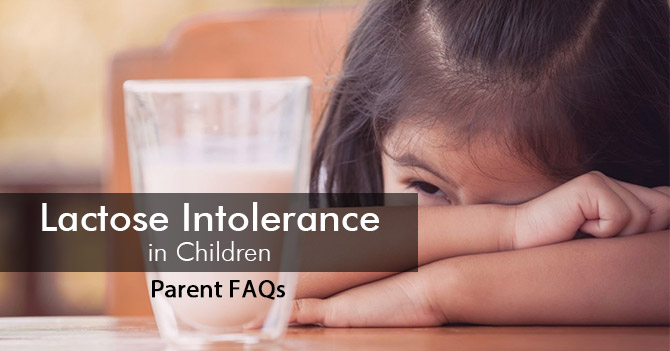Anushka struggles every day to convince her five-year-old daughter, Ankita, to finish her glass of milk, often forcing her to gulp it down. The struggle reached a peak last Wednesday evening about an hour after the child finished her glass of milk. Ankita spent much of that night in pain. She had abdominal cramps and diarrhoea and told her mother that she felt sick to her stomach. That’s when the child’s mother realized that this could be a sign of a serious health condition and took her to see a doctor the very next day.
The doctor asked Ankita and her mother a number of questions and noted that the child’s discomfort seemed to be associated with milk and dairy products. The answers led to the suspicion that the child may be lactose intolerant and said that he would like to have a test performed to verify the suspicion. The test result confirmed his suspicion.
The doctor explained lactose intolerance – a set of symptoms caused by the body’s inability to digest lactose – to Anushka. He also discussed how she could best alter her daughter’s diet to prevent discomfort while still obtaining sufficient calcium. The doctor also mentioned various products that contain lactase, the enzyme responsible for lactose digestion, and assured the mother that using one of those products her daughter would still be able to consume dairy products, including a glass of milk occasionally.
How Lactose Intolerance Works
Lactose is a sugar present in food that most children love, including ice cream, milk, and cheese. It is also found in some salad dressings, baked goods, candies, sauces, and so on. Breast milk and infant formulas too contain lactose.
Lactose is made up of glucose and galactose – two simple sugar molecules. In order for it to be absorbed by the body, lactose has to be split into its two components by an enzyme called lactase, which is found in the lining of the small intestine. But for those who are lactose intolerant, the activity of lactase is ineffective. It’s unable to digest and absorb lactose in the small intestine, which then passes into the large intestine where it’s fermented by gut bacteria. This process produces carbon dioxide and hydrogen, and certain by-products which possess a laxative effect.
What Causes Lactose Intolerance?
Lactose intolerance may happen to both adults and children. Some common causes include the following:
- Digestive disease or infection
- Small intestine injury
- Family history of lactose intolerance. In such cases, over time the body may make less of the lactase enzyme. Symptoms may show during the teens or adult years.
- A baby born too early – a premature baby. This type of lactose intolerance can be a short-term problem that usually does not last.
In rare cases, some new-borns cannot make lactase from birth. This condition is known as congenital lactase deficiency.
Signs Your Child is Lactose Intolerant
If your child is intolerant, the symptoms will be directly proportional to the quantity consumed. The following are some of the common symptoms you should look out for, especially after your child consumes dairy products:
- Loose stools and gas
- Watery diarrhoea
- Stomach bloating, gas
- Stomach “growling” or making rumbling sounds
- Upset stomach and nausea
- Skin rashes and frequent colds
- Abdominal pain and cramping
Parents often confuse lactose intolerance with a milk allergy. Although both have similar symptoms, these are different conditions. A milk allergy is an immune system reaction that generally appears in the first year of life. Lactose intolerance is a digestive issue that’s rarely seen in toddlers or infants.
Lactose intolerance symptoms can start in adolescence or late childhood, and may become more noticeable when stepping into adulthood. Apart from the discomfort generally associated with the above-mentioned symptoms, lactose intolerance is a non-threatening disorder with minimal or no long-term complications.
How is lactose intolerance diagnosed?
Your paediatrician will seek a medical, family, and diet history to help diagnose lactose intolerance in your child. During the discussion, he/she will review your child’s symptoms with you.
- In some cases, a hydrogen breath test is performed to test for lactose intolerance
- Paediatricians check acidity in the stools of infants and young children who are unable to take the hydrogen breath test. Acidic stool (low pH) indicate lactose malabsorption. Another stool test (reducing substances) checks glucose in the stool, which signifies undigested lactose.
- If your child’s symptoms persist, he/she may be referred to a paediatric gastroenterologist (GI) for further evaluation.
How is Lactose Intolerance Treated?
Treatment depends on your child’s age, symptoms, general health, and how severe the condition is. But remember that no treatment will help produce more lactase. It is easy to manage your child’s symptoms by following a diet that limits lactose intake. He/she may not have to stop consuming all foods that contain lactose. Your child’s healthcare provider may also suggest some over-the-counter enzymes that can help.
Here are some tips for managing lactose in your child’s diet:
- Start slowly. After a week of limiting foods with lactose, add small amounts of milk or milk products to the diet to see if there are any symptoms. Note the foods your child can handle and the ones he/she must avoid.
- Milk and milk-based products should be consumed with other foods. For instance, let your child have milk with cereal or cheese with crackers. This is likely to reduce the symptoms.
- Opt for dairy products that have lower levels of lactose such as yogurt and hard cheeses.
- Choose lactose-reduced and lactose-free milk and milk-based products.
- Ask your child’s healthcare provider if your child must take lactase pills or lactase drops when consuming milk products.
Consult a dietitian to know what products or dietary changes may help your child.
When should I call my healthcare provider?
Seek immediate medical health if you have trouble managing symptoms. Your paediatrician can work with you to help keep them in check.



